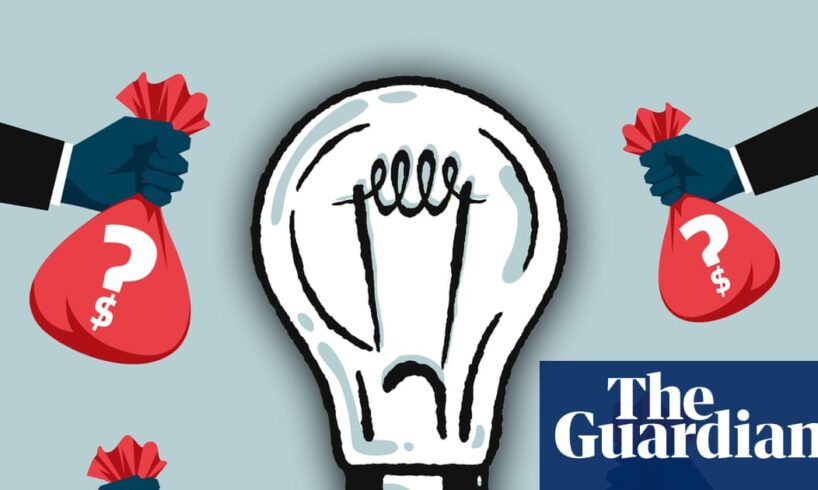
Australia’s biggest thinktanks are deeply divided on whether disclosing their financial backers is in the public interest, with several raising concerns that efforts to keep them secret may be undermining trust in the sector.
Three influential policy groups that together receive almost $20m in donations a year refuse to reveal their key donors, including those whose commercial interests may overlap with their public advocacy campaigns.
The progressive Australia Institute, the right-leaning Centre for Independent Studies and the conservative Institute of Public Affairs argue they cannot reveal their donors without exposing them to attack from political opponents.
This is despite other thinktanks believing disclosure is clearly in the public interest given their influence in policy debates and establishing their own voluntary thresholds for reporting. These range from $50 contributions from individuals to large donations from institutional donors.
The Grattan Institute, which lists every donation of more than $1,000, has previously warned groups may be using thinktanks to “lend credibility to their case”. A spokesperson for the thinktank said keeping major donors secret raised legitimate questions about commercial or political influence.
“Transparency is not necessarily sufficient for trust, but it is fair to say that if donations are not disclosed, then that begs questions about ‘who’s paying?’ and what agenda they might have,” a Grattan spokesperson said.
A spokesperson for the progressive thinktank Per Capita, which discloses all donations worth more than $5,000, said “transparency is vital to ensuring faith in the policy process, because when people can see who funded them and the values of the donors, they can trust that policy debates are open and fair”.
Quick GuideContact us about this storyShow
The best public interest journalism relies on first-hand accounts from people in the know.
If you have something to share on this subject you can contact us confidentially using the following methods.
Secure Messaging in the Guardian app
The Guardian app has a tool to send tips about stories. Messages are end to end encrypted and concealed within the routine activity that every Guardian mobile app performs. This prevents an observer from knowing that you are communicating with us at all, let alone what is being said.
If you don’t already have the Guardian app, download it (iOS/Android) and go to the menu. Select ‘Secure Messaging’.
SecureDrop, instant messengers, email, telephone and post
If you can safely use the tor network without being observed or monitored you can send messages and documents to the Guardian via our SecureDrop platform.
Finally, our guide at theguardian.com/tips lists several ways to contact us securely, and discusses the pros and cons of each.
Illustration: Guardian Design / Rich Cousins
Thank you for your feedback.
The Committee for the Economic Development of Australia (Ceda) discloses all donations worth $50 or more to “maintain the trust of our members and other stakeholders”, which includes the state and federal governments they lobby for policy change.
The Centre for Public Integrity discloses major institutional donors such as the McKinnon and Myer foundations but withholds the names of roughly 5,000 individual donors who provide an average of $40 each, citing “important privacy considerations”.
“As a general proposition, transparency of funding sources helps improve trust,” a spokesperson for the centre said.
Sign up: AU Breaking News email
The centre and Transparency International Australia, which reveals its “large individual donors”, both agree uniform disclosure rules would benefit the sector and provide clear expectations.
“[They] would provide a clear, level playing field, ensuring that all organisations are held to the same expectations of transparency,” said Transparency International Australia’s chief executive, Clancy Moore.
“Disclosure of funding enhances trust by demonstrating that organisations are open about sources of support. While donations are important to sustain most research and civil society organisations, transparency helps show how research outputs are guided by evidence, not by funders’ preferences.”
That argument was rejected by a Centre for Independent Studies (CIS) spokesperson, who said “we do not accept there is a general public interest in identifying funders of research or public policy work”.
“There are several good reasons why we do not disclose this information, including the likelihood that critics of our work will trawl through our list of funders seeking to impugn our motives rather than answer our analysis,” the spokesperson said.
“The CIS strongly believes in the axiom: before impugning an opponent’s motives, first answer their arguments.”
skip past newsletter promotion
Sign up to Breaking News Australia
Get the most important news as it breaks
Privacy Notice: Newsletters may contain information about charities, online ads, and content funded by outside parties. If you do not have an account, we will create a guest account for you on theguardian.com to send you this newsletter. You can complete full registration at any time. For more information about how we use your data see our Privacy Policy. We use Google reCaptcha to protect our website and the Google Privacy Policy and Terms of Service apply.
after newsletter promotion
An Institute of Public Affairs spokesperson said its donors were kept private as “it has unfortunately been the case in the past that our supporters have been targeted by activists for standing up for the Australian way of life”.
An Australia Institute spokesperson said it keeps its donors private as “other charities have been targeted, rather than praised, by powerful voices for their generous support for work designed to highlight the problems of rising inequity and greenhouse gas emissions”.
Enrique Mendizabal, the executive director of On Think Tanks, a global organisation supporting the sector, said disclosure could threaten the safety of donors in certain parts of the world, including eastern Europe.
“This is not the case in Australia,” Mendizabal said.
Hans Gutbrod, who conducted a worldwide study of thinktank funding transparency in 2015, said Australia had a reputation for “a remarkably opaque policy research landscape”.
“We do think it’s legitimate to fund work, but that it does greatly increase the credibility of the research if all contributions are openly disclosed,” said Gutbrod, the executive director of Transparify.
“Our strong impression is that Australia is broadly lagging in disclosure, in that this has not become part of the public debate in contrast to the United Kingdom and the United States.”
David Hughes, the executive director of the Liberal party-aligned Menzies Research Centre, which reports “significant” donors, said any uniform approach to disclosure should consider the regulatory impact on many small thinktanks with relatively few resources.
Do you know more about who funds Australia’s thinktanks? Contact henry.belot@theguardian.com





